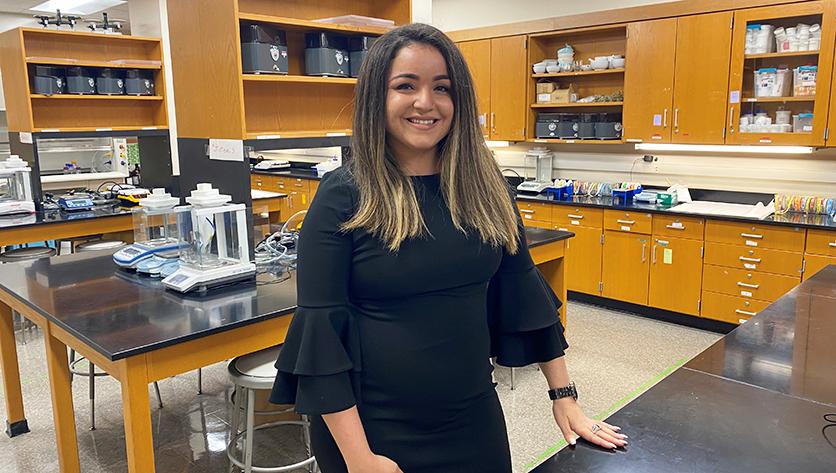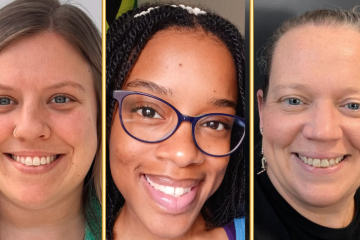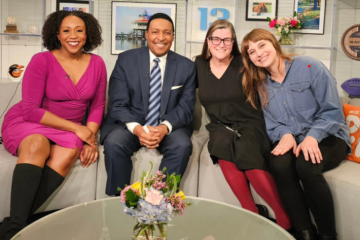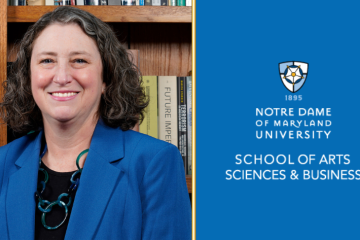Class of 2022 Spotlight: Paola Rivera Mudafort

By: Erik Pedersen, Senior Communications Manager
BALTIMORE – Originally from Puerto Rico, Paola Rivera Mudafort D’22 first came to Maryland 10 years ago after enrolling at Goucher College for her undergraduate studies.
It was at another local school where two more important events occurred for Rivera Mudafort: she decided she wanted to become a pharmacist, and she was introduced to Notre Dame of Maryland University for the first time.
While assisting with a tuberculosis study at the Johns Hopkins University School of Medicine, her supervisor, Dr. Gina Maltas, told her that her background as a chemistry major could be suitable for pharmacy. She also mentioned that a high number of Puerto Rican students were already enrolled in NDMU’s program, which was a key selling point during a time where Rivera Mudafort was beginning to feel detached from her culture after several years away from the island.
Years after that initial introduction, Rivera Mudafort is set to graduate from the School of Pharmacy this May, and she will be remaining in Maryland to begin her PGY-1 pharmacy practice residency at Anne Arundel Medical Center in the fall.
Learn more about Rivera Mudafort’s NDMU experience below in today’s Class of 2022 spotlight:
What made you want to become a pharmacist?
I was interested in helping the immigrant community in Baltimore. Both as an undergrad and after graduating from Goucher, I was part of a non-profit organization, CASA de Maryland, which works with the local immigrant population.
Some of them struggle with their healthcare providers due to language disparities. It might seem like a simple process to just do what the provider tells you, but it can be very difficult when you don’t understand English and you can’t identify what they’re saying. I speak both English and Spanish, so as a pharmacist I want to use both my medical knowledge and my ability to speak Spanish to help those communities and serve as a person they can look up to.
How did you first hear about the program at Notre Dame, and what led you to apply here?
My boss at Johns Hopkins, Gina Maltas, she was the first to mention it to me. And she also talked about the high population of Puerto Ricans that attended the School of Pharmacy. My undergrad only had a few Puerto Ricans, and when I moved from Puerto Rico to the United States I ended up a little detached from my own culture.
Another thing that drew me was the class sizes. I’ve always preferred to have a small group of people in my classes. It allows you to have a more personal relationship with your professors. You can ask questions and they’ll answer them during class rather than having to reach out later or send an email.
Did you have a favorite class at Notre Dame?
I really enjoyed the pharmaceutics portion of the curriculum, which took place in lab settings. I like the compounding of medications, making the capsules, making the creams and the lotions. Those experiences helped me a lot in one of my rotations as a P-4 student. It was at a compounding pharmacy, so I already had some advance knowledge and then I was able to brush up on my skills and continue to improve.
Talk about some of your rotation experiences at NDMU. What locations did you work at in the area?
As a pharmacy student, we have two rotations. The first one was during my second year, it was an introductory pharmacy practice experience. It’s divided between a healthcare system, or hospital pharmacy, and then a community pharmacy. During that year, I went to the Johns Hopkins Hospital main campus in the Weinberg building, which is the oncology department. For my community rotation I worked at a CVS pharmacy, which was a new experience for me because I did not have any background working in an actual pharmacy before coming here.
Then during the last year, we have our intensive rotations where every five weeks we rotated to a different location. The first of those was a compounding pharmacy, Professional Arts Pharmacy, where I was able to compound a lot of dosage forms, such as capsules, tablets, lotions, creams, all of those sorts of things. The second one was at Walgreens, which was nice because I was able to compare the dynamic between CVS and Walgreens, how each differ, why they package medications in their own certain way.
The third one was at the Anne Arundel Medical Center in Annapolis. I was in the ambulatory care clinic, which is an anticoagulation clinic. We basically managed patients that are taking warfarin, which is an anticoagulant that has to be monitored very closely. Then I did a clinical trial rotation again at Hopkins, and that had four rotations. I had an investigational rotation, an in-patient acute care, an oncology and a cardiology rotation.
Do you feel like the pharmacy program at Notre Dame has set you up for success after graduation?
Definitely. I feel like that’s a constant thing, they are always working to set you up to succeed. The pharmacy curriculum is very hard - it’s hard material no matter where you go. What attracted me to go here, and they’ve continued to emphasize this throughout my four years, is the open-door policy of all the professors. These professors not only teach for the School of Pharmacy, they also have their own practices. But despite their busy schedules, every time I had a question they would make me feel comfortable, they’d explain things to me, they’d sit with me and go over the material as long as I needed.
Outside of the classroom experiences, what are some other top Notre Dame memories?
The School of Pharmacy has several student pharmacy organizations. One of them was APhA, or the American Pharmacists Association. I was the Operation Diabetes Co-Chair through my third year, and one of the events that I was able to do on two occasions was the ADA (American Diabetes Association) Step Out Walk for Diabetes. In my second year we went to Baltimore City and walked to promote awareness of those diagnosed with diabetes, and I still have a fond memory of that experience.
I was also the Fighting Diabetes chair for SNPhA, the Student National Pharmaceutical Association, and I was treasurer for the Student Society of Health Systems Pharmacists group (SSHP). There are a lot of opportunities to not only study pharmacy here at Notre Dame, but also to branch out. It allows you to meet other pharmacists that in the long run could offer you a job.
Is there a message you would like to share with pharmacy students who are still working their way through the program?
The pharmacy curriculum can seem very overwhelming, there might be times where you’re stressed and want to quit. But I would say to enjoy every step of the way, because at the end those four years will have flown by. Especially during that fourth year, I still remember starting in June and all of a sudden now we’re preparing for graduation.
Be consistent and keep working hard. It can be challenging to keep all of your classes together and maintain your personal life, but at the end of the day it will pay off. It definitely is worth it.
Established in 1895, Notre Dame of Maryland University (NDMU) is a private, Catholic institution in Baltimore, Maryland, with the mission to educate leaders to transform the world. Notre Dame has been named one of the best "Regional Universities North" by U.S. News & World Report.




